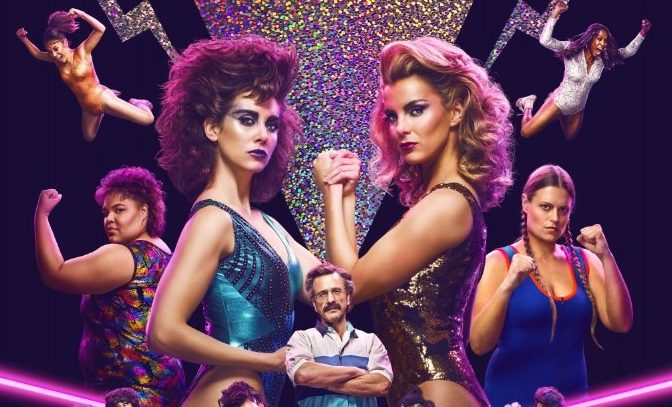When I watched Netflix’s latest success, GLOW, what I expected was to see a faithful-to-the-ugly-’80s dramedy about the makings of real-life ’80s wrestling show GLOW: Gorgeous Ladies of Wrestling. I expected a focus on strong women, which there was. But what I didn’t expect was a sneak attack of much-needed racial commentary.
One of the show’s overarching themes is how much racial stereotyping and trope plays into the world of entertainment wrestling. Racial and ethnic stereotypes have been an often-overlooked, but integral part of entertainment wrestling’s success, such as The Iron Sheik, Samoa Joe, Sheamus, Latin Lover, Sabu, Mexican America, “Rowdy” Roddy Piper and G-Rilla, the original gangsta character George Murdoch (aka WWE’s Brodus Clay and Impact Wrestling’s Tyrus) adopted to start his career. Stereotypes of all forms play a part in wresting’s personas, from the hillbilly character of Bubba Ray Dudley and the gimmicky play on Hornswoggle‘s height as a little person to the cartoonish, flamboyant “macho man” brashness of Hulk Hogan, Bret Hart, and Randy Savage and spoiled brattiness of “The Miracle” Mike Bennett and his wife, “The First Lady of Wrestling” Maria Kanellis Bennett, to the self-explanatory nature of The Honky Tonk Man.
The show explores exactly why stereotypes are seen as means to an end in the world of wrestling–it’s easy to create a character. Unlike how director Sam Sylvia (Marc Maron) was trying to create an indie subversive treatise on the patriarchy with characters who needed a lot of backstory, there is no need for characters with layers in professional wrestling. The ease of stereotypes, especially the racial ones, allow for the audience to quickly understand who a character is and what their motivations are in one sentence (or in some cases, no sentences at all). Carmen Wade (Britney Young) is part Cherokee, but instead, her character is the Incan gentle giant Machu Picchu, with simultaneously plays on Carmen’s lovable demeanor and the stereotype of the wise, ancient, “medicine woman” type. Reggie Walsh (Marianna Palka) plays on a mish-mash of Viking and Nordic stereotypes as Vicky the Viking, who pillages towns.
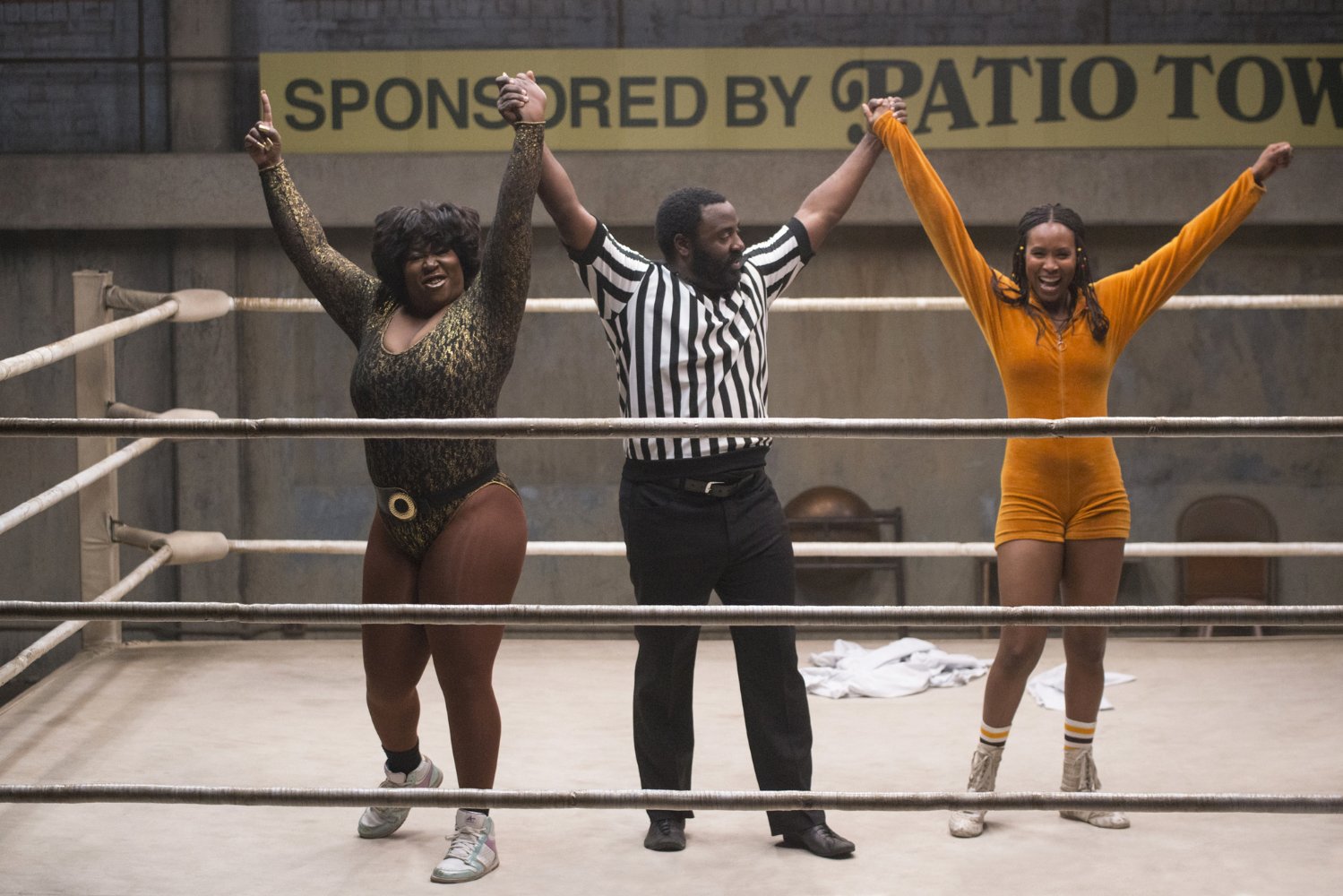
Beirut (Sunita Mani) is, in wrestling terms, a “heel” by playing on the “brown-as-terrorist” stereotype that was reinforced within the season thanks to a newscast of Lebanese terrorists who held a U.S. plane hostage. It doesn’t matter that the character behind Beruit, Arthie Premkumar, isn’t actually Lebanese. Welfare Queen (Kia Stevens) spoke to the image white America had (or still has) of the poor black woman–that she’s actually a lazy slob living in wealth thanks to taking advantage of the government. It doesn’t matter that the character’s real persona, Tammé Dawson, actually worried about if her son, who is getting an Ivy League education, might be made fun of or, worse, that her son could actually come to resent her playing on all the stereotypes they’ve worked to disavow. Fortune Cookie aka Jenny Chey (Ellen Wong) is actually Cambodian, but what’s important is that she wrap up all of America’s dis-ease with the Vietnam War and its growing tension with communist China in one small bamboo hat-wearing package.
The ultimate heel of the show, Zoya the Destroyer aka Ruth Wilder (Alison Brie) plays heavily on America’s fear of Soviet Russia. Does it matter that “Zoya” isn’t actually Russian? Nope. All that matters is that she portrays every Russian stereotype to the nth degree. The same goes for Liberty Belle aka Debbie Eagan (Betty Gilpin), who has to play up every nasty stereotype about “The Good U.S. of A.,” which includes believing White Jesus is an American citizen, that apple pie reflects patriotism (even though it’s actually Dutch in origin), and that blonde and white equals pure and “All-American.”
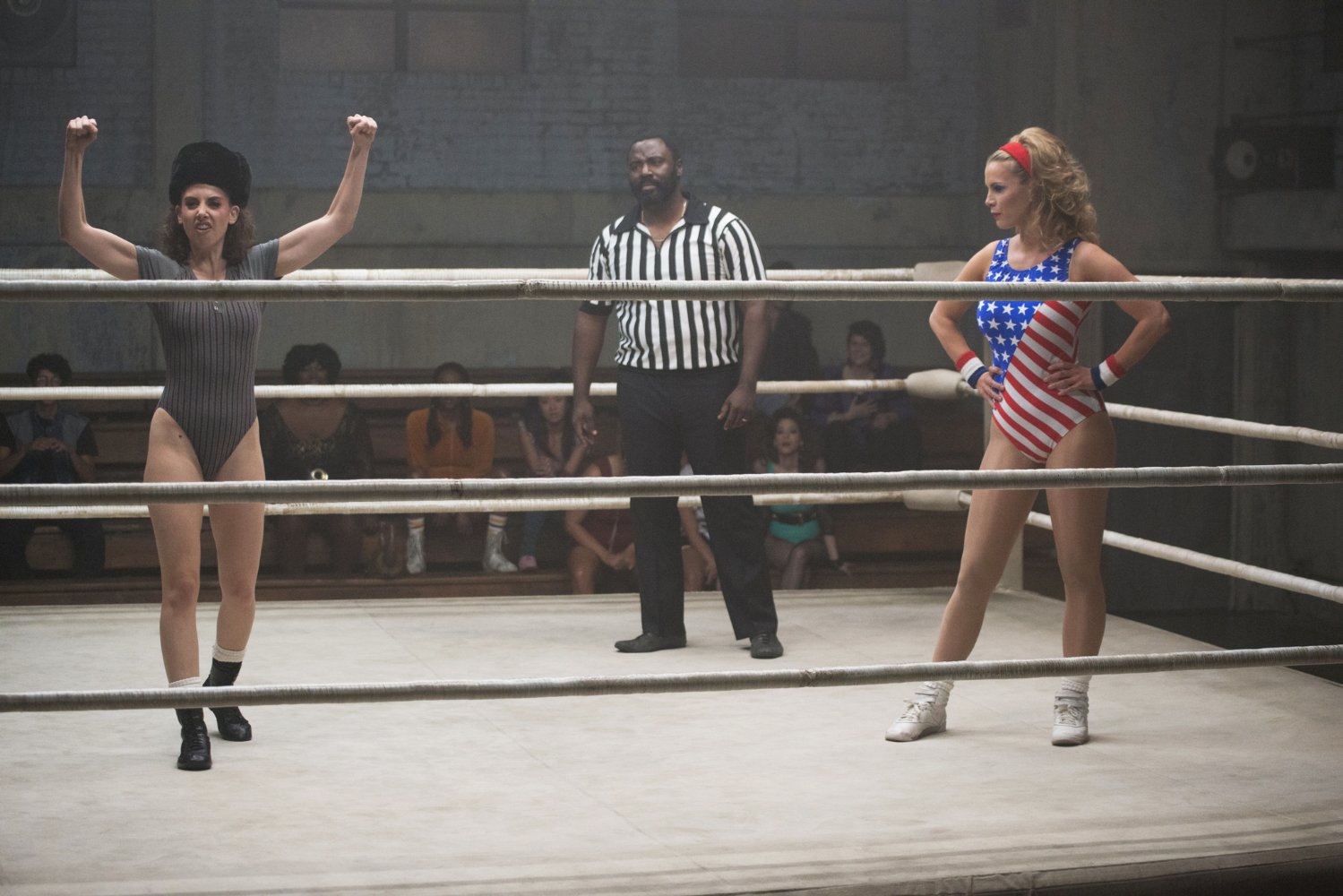
However, stereotyping is quickly shown to be a double-edged sword; while it might be easy to get your characters out, it also opens the fans, particularly those who don’t realize the gag, to use the stereotypes as an excuse to showcase their racism. The best example of this is in the final episode, when Arthie gets spit on and heckled with racial epithets. The fact that she’s playing up the terrorist stereotype could be, if we’re using Sam and producer Bash’s (Chris Lowell) lenses, subverting the stereotype itself and taking the power away from that image by mocking the absurdity of the stereotype. But the audience for wrestling isn’t thinking about writing a thesis on stereotype subversion. What ends up happening is that there are some fans who believe whatever is put in front of them, and if they see a stereotype of a terrorist, they feel justified in hurling racial slurs. What happens to Arthie is exactly what Tammé and Junk Chain aka Cherry Bang (Sydelle Noel) discuss one-on-one; how will they know if the audience is in on the joke and laughing with them instead of laughing at them?
The first season of GLOW sets up for a second season that seems ripe to dig deeper into the emotional fallout the wrestlers will go through when it comes to playing up stereotypes. We were left with a question mark on whether Cherry would continue with the group, seeing how she aced an audition for a lead part on a TV procedural. The procedural itself seems to still be in line with Cherry’s blaxploitation past, but still, it’s miles better for her than the work she’s putting out as Junk Chain. For her, she’d finally be seen as a legitimate actress, not a B-movie star. Arthie might have a love for TV wrestling, but that love might pale in comparison to the amount of inner turmoil she’s already facing after her first TV match. Ruth is naively oblivious to the fact that she’s not portraying Russians as actual Russians, something made clear when she went with the hotel owner to his family’s gathering. But she’s primed and ready for a huge inner dilemma next season. Tammé hasn’t had to face her son yet, but with GLOW’s growing popularity, she’ll certainly have to.
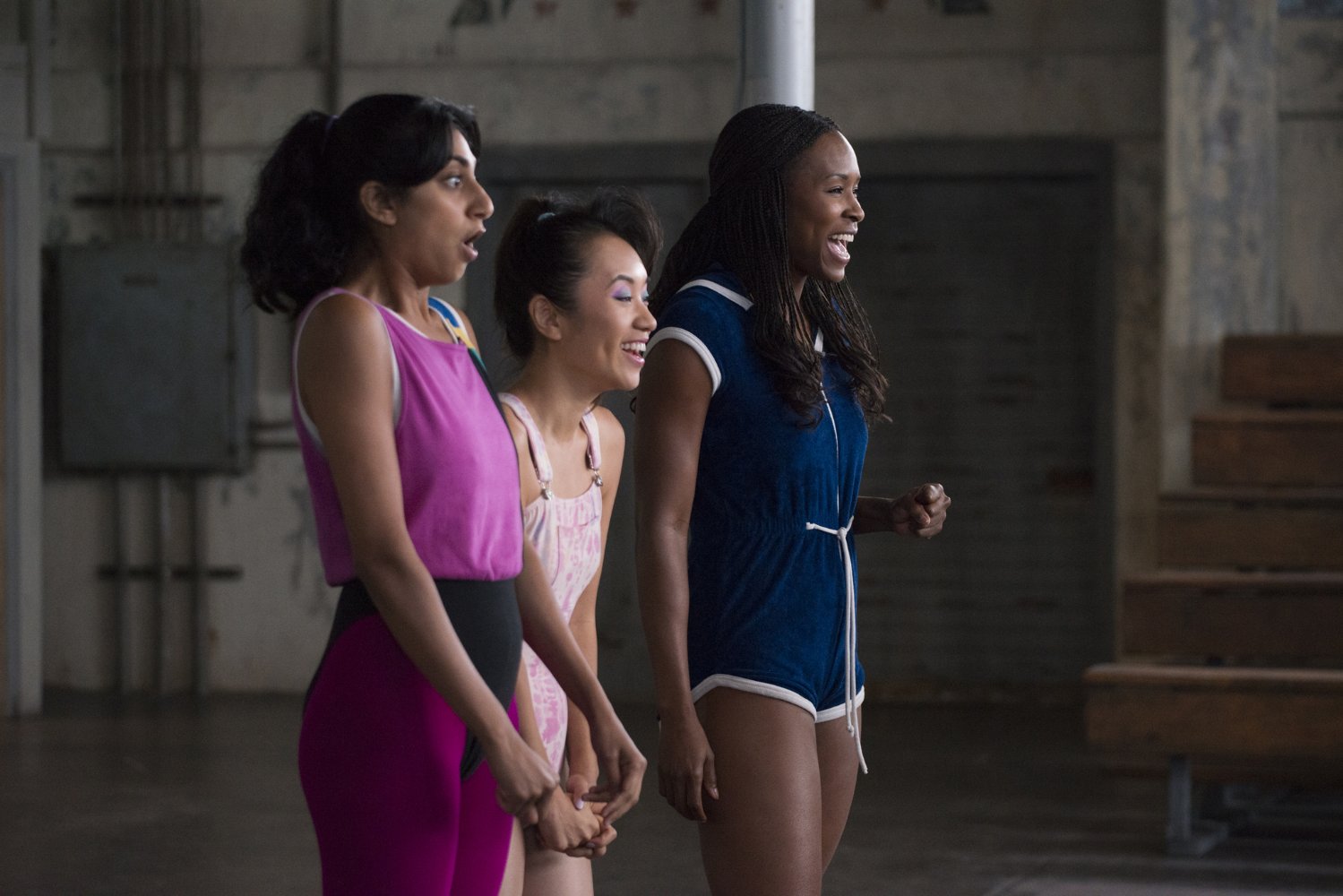
As The Atlantic‘s Dion Beary wrote in the 2014 article, Pro Wrestling is Fake, but Its Race Problem Isn’t, it’s the behind-the-scenes dilemmas that are the real draw for wrestling fans, since what happens in real life is often woven into the on-screen conflicts. And, just like how racial stereotyping and racism itself is a part of GLOW, The WWE was also facing its own issues with racial bias.
Beary detailed how the WWE’s black wrestlers were constantly getting beaten in the ring, from “jobbers”–wrestlers whose main job is to be beaten–and veteran wrestlers alike, like Big E and “The World’s Strongest Man” Mark Henry. All of this highlights the fact that in its then-62 years, the federation had yet to crown a black wrestler the winner of the WWE Championship, the highest honor in the federation.
The article focuses on a 2003 WWE match to make its point. WWE’s RAW World Champion was Triple H, and the underdog looking to take him on was Booker T, a black wrestler.
“‘Somebody like you doesn’t get to be a world champion,’ Triple H told Booker T during a promo, a segment meant to build excitement for a match. Triple H made mention of Booker’s ‘Nappy hair,’ and claimed Booker was in the WWE to make people laugh, to be an entertainer rather than a competitor, to ‘do a little dance’ for him.
The crowd ate it up, and loud ‘ASSHOLE’ chants rained down on Triple H. The next week, Booker T gave an impassioned talk about his past, about how he’s overcome every obstacle that has been put in his way in life, and how he was going to beat the odds again at Wrestlemania 19 to become the world champion. It was, in one sense, brilliant storytelling. Hollywood is chock-full of plots that involve scrappy minorities overcoming racism to accomplish their dreams. With Triple H as the franchise, and the franchise’s job being to eventually lose to the underdog, fans were thoroughly in the corner of Booker T. The storybook ending just made so much sense.
And then Triple H won. 1-2-3. There was no cheating, no controversial finish, non ambiguity about it.
There’s real-life drama and then there’s fictional drama. WWE’s response to allegations of racism, misogyny, homophobia ad ableism have always been the same: It’s fictional. But that excuse wears thin when the fictional racism lines up perfectly with the real-life racism.”
According to Wikipedia, there still hasn’t been a black wrestler crowned as the ultimate champion. However, wrestlers of other minority backgrounds have been crowned throughout the championship’s run in the late ’90s and ’00s, including The Rock, Eddie Guerrero, Yokozuna, Alberto Del Rio, Rey Mysterio, and Batista. Still, the fact remains that in matches such as the one between Triple H and Booker T, racially-laced storylines play a huge part in professional wrestling, much to its detriment.
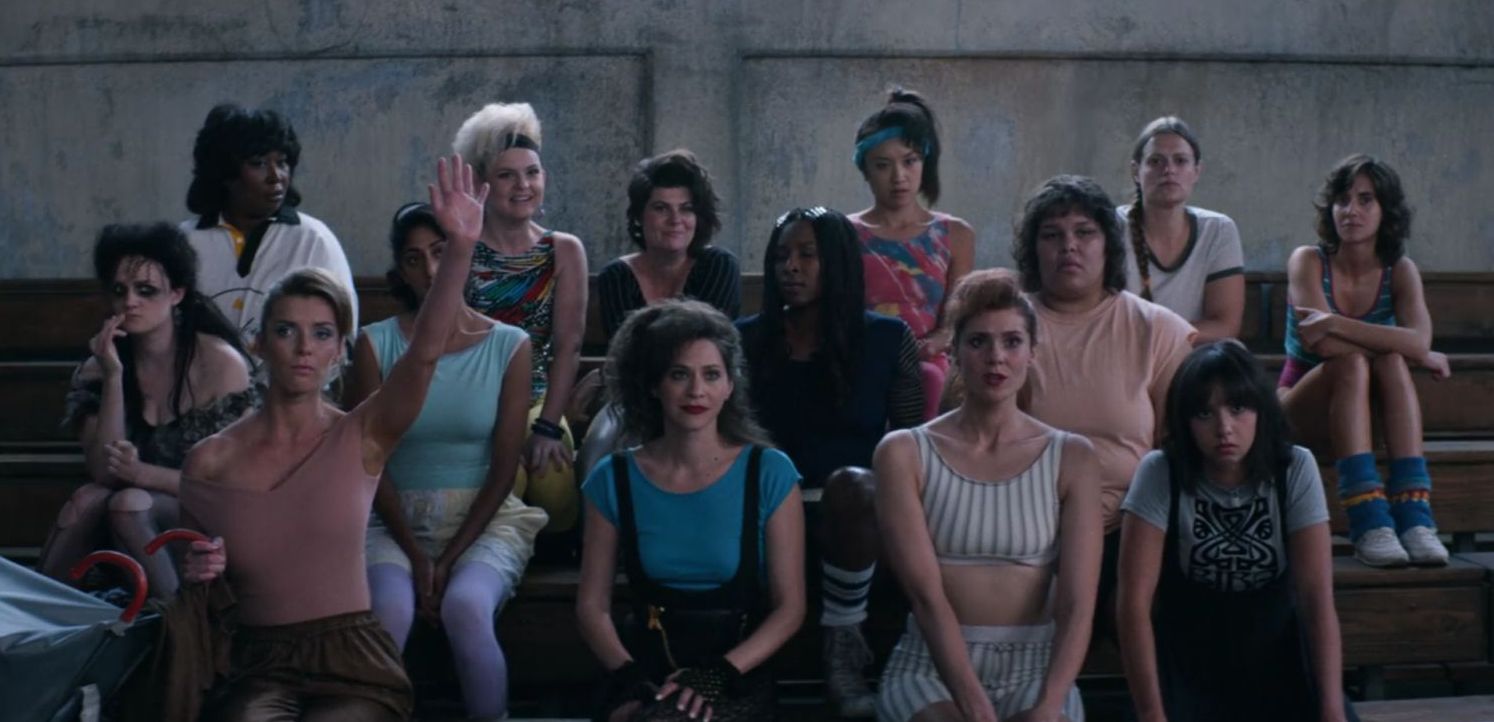
What’s happening in GLOW not only shines a light on the issues plaguing professional wrestling, but also the acting industry as a whole. The same problem affecting Ruth and the other GLOW women are the same ones affecting actors today–all of the great, meaty roles are given to white men, while everyone else has to make lemonade out of lemon roles, with your success hinging on how much (or how willingly) you lean into your assigned stereotype. But as GLOW shows, even if you happily go into creating the best stereotypical character ever, your reward might be in the form of diminishing returns.
The success of GLOW’s second season will hang on just how much time is devoted to delving into the problems caused by the cast opening up Pandora’s Box of stereotyping. With so much material to mine, from the world of professional wrestling to the real life actresses’ own stories of offensive casting and other Hollywood horrors, it’d be to GLOW‘s detriment if it doesn’t hold Hollywood down in a headlock in Season 2.
